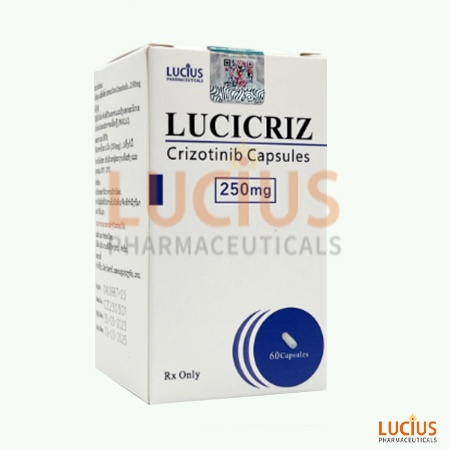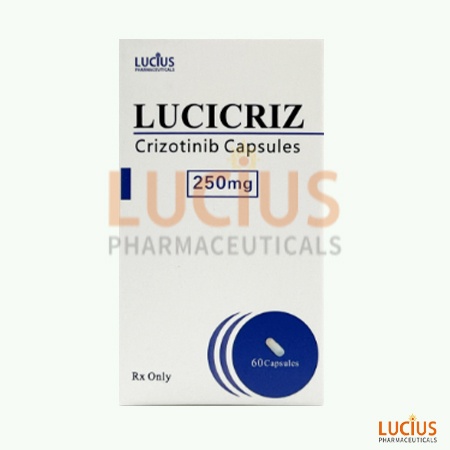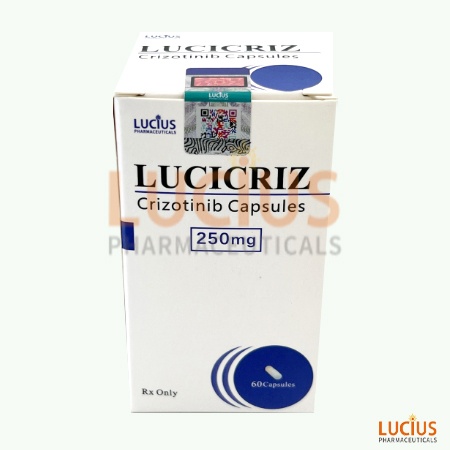





Another NameXalkori、Crizalk、Crizocent、Crizonix、克唑替尼、赛可瑞
IndicationsCrizotinib is suitable for the treatment of non-small cell lung cancer.
Reg No.04 L 0967/23
Inspection NO.
The original manufacturer of Crizotinib is Pfizer. Crizotinib is widely used globally for the treatment of ALK positive non-small cell lung cancer and ROS1 positive non-small cell lung cancer, and its efficacy and safety have been widely recognized.
The specification of Crizotinib produced by Lucius is 250mg*60 capsules, with a shelf life of 36 months.
Clozotinib is an ALK gene inhibitor with high safety and low toxicity. As a new targeted drug for the treatment of advanced non-small cell lung cancer, it can specifically inhibit tumor growth and accelerate tumor cell apoptosis.
Crizotinib
Adult patients with non-small cell lung cancer.
Based on findings from animal studies and its mechanism of action, Crizotinib can cause fetal harm when administered to a pregnant woman. There are no available data on the use of Crizotinib in pregnant women. In animal reproduction studies, oral administration of crizotinib to pregnant rats during organogenesis at exposures similar to those expected with the maximum recommended human dose resulted in embryotoxicity and fetotoxicity. Advise pregnant women of the potential risk to a fetus.
There is no information regarding the presence of crizotinib or its metabolites in human milk, or the effects on the breastfed child or on milk production. Because of the potential for adverse reactions in breastfed children, advise women not to breastfeed during treatment with Crizotinib and for 45 days after the last dose.
Females
Advise females of reproductive potential to use effective contraception during treatment with Crizotinib and for 45 days after the last dose.
Males
Because of the potential for genotoxicity, advise male patients with female partners of reproductive potential to use condoms during treatment with Crizotinib and for 90 days after the last dose.
The safety and effectiveness of Crizotinib have been established in pediatric patients 1 year of age and older with relapsed or refractory,systemic ALK-positive ALCL or with unresectable, recurrent, or refractory ALK positive IMT. The safety and effectiveness have not been established in pediatric patients younger than 1 year of age with ALCL or with IMT, or in any pediatric patients with NSCLC.
No overall differences in safety or effectiveness were observed between these patients and younger patients.
Crizotinib concentrations increased in patients with pre-existing moderate (any AST and total bilirubin greater than 1.5 times ULN and less than or equal to 3 times ULN) or severe (any AST and total bilirubin greater than 3 times ULN) hepatic impairment. Reduce Crizotinib dosage in patients with moderate or severe hepatic impairment. No dose adjustment is recommended in patients with pre-existing mild hepatic impairment (AST > ULN and total bilirubin less than or equal to 1 times ULN or any AST and total bilirubin greater than 1 times ULN but less than or equal to1.5 times ULN).
Increased exposure to crizotinib occurred in patients with pre-existing severe renal impairment (CLcr less than 30 mL/min calculated using the modified Cockcroft-Gault equation for adult patients and the Schwartz equation for pediatric patients) not requiring dialysis, therefore reduce dosage of Crizotinib in these patients. No dose adjustment is recommended in patients with mild to moderate renal impairment (CLcr 30 to 89 mL/min).
Drug overdose is not yet clear.
Store at room temperature 20° to 25°C (68° to 77°F); excursions permitted between 15° to 30°C (59° to 86°F).
A single crizotinib capsule dose was absorbed with median time to achieve peak concentration (Tmax) of 4 to 6 hours, and the mean absolute bioavailability of 43% (range: 32% to 66%).
from FDA,2023.09